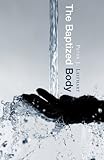 The Baptized Body by Peter J. Leithart
The Baptized Body by Peter J. LeithartMy review
rating: 5 of 5 stars
Argues the radical thesis that, in the New Testament, baptism means baptism, and that baptism does everything attributed to it. Why didn't someone in the Reformed tradition think of this sooner? Maybe it takes awhile to get over our knee-jerk reaction to Rome.
Leithart also argues that sacraments repair the original design of creation. Grace repairs nature, it does not lay down a "separate track" that intersects with regular life at a later conversion experience. Infant baptism restores the infants relationship to God that was disrupted by the fall, so that nature and grace work on the same track from the beginning of life. Thus, through the sacraments of baptism and the Lord's Supper, New Covenant life resembles the way life would have been lived under the Adamic covenant.
Christians shouldn't raise children so as to bring them into the covenant, but we should raise them from within the covenant. Leithart says that we start talking to our children not because they understand us, but so that they will. Baptism is God's language whereby he starts talking to his children and initiates a relationship with them. Sacraments are word after all.
Leithart also argues that the terminology "means of grace" makes grace sound like a substance that can be channelled. I would add that it seems to resonate with scientific ways ways of thinking about raw materials. Leithart suggests that the gift imagery of Scripture doesn't need help here. In the covenant, grace works naturally upon our children as we talk of the things of God when we get up, lay down, and walk along the way (Deut. 6:4-6).
View all my reviews.

2 comments:
Good points.
Just read this parable from Doug Wilson about the objectivity of the covenant of baptism:
“A much overworked session of Presbyterian elders had just finished the hard and thankless task of disciplining their minister, a man who taught that being a Christian was an objective reality, marked by baptism, and that being a faithful Christian was a covenant requirement, to be marked by evangelical faith, hope and love. This was clearly over the line, and so they managed to secure his resignation.
“Another man in the church had followed these proceedings with interest, but then coincidentally, two weeks later, his wife charged him before the session with the sin of adultery, as he was carrying on an affair with the next door neighbor. The session, quite responsibly, called him on the carpet for this. But they were greatly taken aback by his defense. He admitted the affair with the neighbor lady, but when they called on him to repent of his faithlessness to his wife, he then shocked them all.
"I don't have a wife," the man said.
"But you do," one ruling elder said. "She's right there."
"True marriage," the man said, "is a matter of the heart. I have never been married to her in my heart. Sadly, I have never loved her."
"But you got married," another elder said. "In a church. I was there. I heard your vows."
"All externals," the sly sinner replied. "What matters, the essential thing, is always the heart. I heard you emphasize this so strongly, and so well, in the unfortunate circumstances surrounding Pastor Smith. A man is not a Christian, I believe you said, of any kind, I think it was, because of what happened in some church. But if vows in church cannot make someone a Christian in any sense of the word, I hardly see how they can make me a husband."
“Of course, the session, being better Christians than they were logicians, dismissed this novel argument, and proceeded with their discipline. The vote was unanimous, but one elder (with a secret amor two towns over) was silently indebted to the man for the argument. "The heart is key," he thought to himself. "The way to protect true marriage is to limit it to the heart. And this is why I am really married to Tiffany -- two towns over."”
If we’re objectively married as we exchange vows, isn’t one also objectively Christian at his baptism?
Wilson’s logic seems irrefutable.
Great parable!
Leithart argues that ceremonies are performative. The wedding ceremony means we are married whether we act like we are married or pretend that we are unbound. When Obama takes the oath of office, he becomes President regardless of whether he feels like commander and chief or a "johnny come lately."
Circumcision made you an Israelite who was obligated to keep the covenant and objectively saved from the world. It's not dependent on the heart so much as formative of the heart. If the heart rebells then the covenant is violated and judgment follows. Why would baptism be different?
Post a Comment